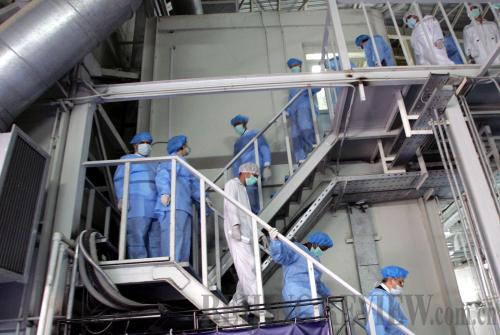|
 |
|
PEACEFUL JOURNEY: IAEA representatives from Egypt, Malaysia, Cuba, Algeria, Sudan and Syria visit the uranium conversion facilities at Isfahan, south of Tehran, on February 3, 2007 (XINHUA/AFP) |
The most recent significant flare up within the organization itself concerned the complex nature of ElBaradei's re-election in 2005.
Initially, Washington strenuously objected to his re-election: ElBaradei had been a vocal opponent of the Bush administration on a series of issues—not limited to its blatantly false allegations of weapons of mass destruction in Iraq.
In the end, however, ElBaradei succeeded in securing a third-term, following backdoor diplomacy with U.S. officials.
As a relatively loose international organization, the IAEA has little power to enforce its will on member states. No agreements or decisions can enter into being, that is, until after a compromise has been reached. The agency's independence, moreover, has always been subject to the varying needs of the oft-competing member states.
For Amano, maintaining good relations with major countries in the world, such as the United States, Russia and China, as well as some regional powers while ensuring the agency's independence is essential to his job.
The second challenge is how to address regional nuclear issues, while promoting non-proliferation. The alleged potential of Iran to acquire nuclear weapons, for one, has been a thorny issue.
After the IAEA brought it before the UN, UN Security Council member states passed a series of resolutions calling on Tehran to halt its uranium enrichment activities while imposing economic sanctions on the Islamic Republic.
But the result was far from satisfactory. Iran has always maintained its right to the peaceful use of nuclear energy and opposed as unfair the international community's moves to take it away.
During the process, the IAEA served as an important platform for bargaining among relevant countries. Indeed, cooperation with the IAEA has been seen as a gauge to judge Iran's—and other non-compliant nations'—progress in implementing UN resolutions.
The Iranian nuclear issue, among others, will remain in play during Amano's tenure. How to make use of the IAEA's resources to mitigate the Iranian nuclear issue still calls for careful thought and diplomacy. This begs the question as to whether Amano should stick to his predecessor's methodology, or pursue another course of action.
The third challenge is how to adjust agency functions. The original plan by which the IAEA was founded dictated its fundamental task is to ensure nuclear technology is used solely for peaceful purposes. That is, the agency is not designed to regulate nuclear security in the military field.
In fact, monitoring military nuclear applications is no easy task. Nations in possession of nuclear weapons will never accept the IAEA's monitoring or security mechanisms.
Nevertheless, the current regional nuclear issues all bear military characteristics. North Korea, for instance, publicly conducted nuclear tests and declared its nuclear capability. Accordingly, some proposed the IAEA put military nuclear programs under its supervision as well.
This and many other decisions lie with Amano. While campaigning for the post of IAEA director general, he said he would steer the agency toward becoming a purely technical organization.
He pointed out that the IAEA should only be a platform to address technical problems—as opposed to an entity of diplomatic mediation. The head of the IAEA, he said, should work to be an implementer of decisions instead of a mediator of international disputes.
Upon taking his post, Amano criticized what he called a worldwide misperception of the IAEA as an agency dealing only with regional nuclear disputes.
Often forgotten, he said, is the basic fact that the IAEA is tasked with promoting the peaceful use of nuclear energy. To this end, Amano pledged greater efforts to help poor countries harness nuclear energy for civilian purposes.
Since its foundation from the ashes of World War II, there can be no question the IAEA is an important organization. And with the end of the Cold War, as its mandate has grown, so, too, has its value in terms of its ever-expanding role.
Whether Amano can breathe fresh air to the IAEA will hinge on his previous experience—not to mention his courage. Indeed, the maintenance of the international nuclear order—and, of course, world peace—depends on it.
Amano's Priorities
Working for nuclear non-proliferation
Enhancing nuclear safety and security
Assisting member states in meeting their energy needs
Responding to concerns about climate change
Helping to ensure food security and clean water
Improving health care through the application of nuclear techniques
(Source: www.iaea.org)
The author is director of the Center for Arms Control and International Security at the China Institute of International Studies
| 